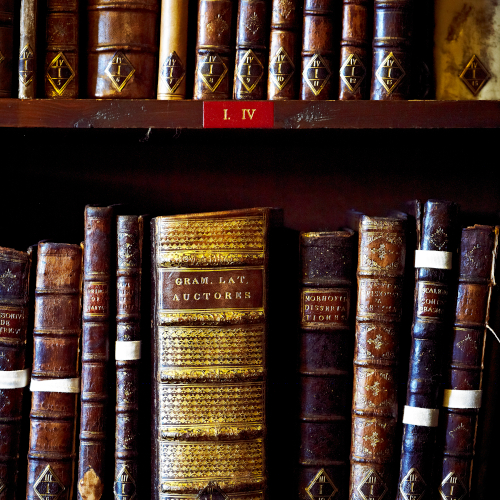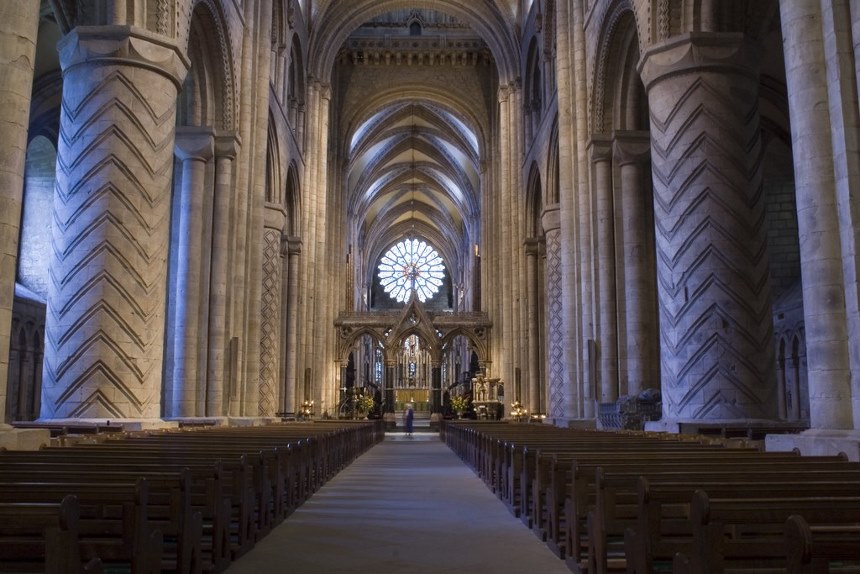Durham Priory Library Recreated
Durham possesses the finest collection of medieval manuscripts of any English cathedral.
Academic Programme
We are pleased to be supporting this project with a comprehensive academic programme designed to unlock significant research leading to notable publications, conferences and exhibitions. Drawing on our members' expertise, the organisation will complement existing IMEMS research under the five key themes listed below.
See a list of the surviving Priory works. Works in the Durham Cathedral and Durham University collections are being digitised as part of the first phase of the Project; Ushaw College books will be digitised as part of a later phase. For further information on the Priory collections see:
- A.B. Mynors, Durham Cathedral Manuscripts to the end of the 12th century (Oxford, 1939)
- Richard Gameson, Manuscript Treasures of Durham Cathedral (III Millennium, 2010)
History of the Book
Leader: Professor Richard Gameson (History) This theme in an extension of current scholarly work on the medieval manuscripts of Durham Cathedral, leading towards a descriptive and analytical catalogue of the collection as a whole, and underpinning the metadata presented in association with individual items on the Durham Priory Library Recreated website.
Community Living: Liturgy, Rules and Well-Being
Leader: Dr James Kelly (Theology) A focus on the extraordinary documents connected to the rhythms of the Cathedral priory, from the organisation of worship, prayer and music, ecclesiastical dramas early in the western medieval tradition, to bi-lingual monastic rules, preaching manuals and texts for the spiritual and medical well-being of the community and those they served.
Scholastic Learning and Philosophical Enquiry
Leader: Dr Sara L. Uckelman (Philosophy) The collection of scholastic texts, from glossed bibles to commentaries, forms the basis of this theme. The continued use of, and collection of, older texts, patristic and early medieval, alongside the acquisition of new texts from Oxford and elsewhere in the 13th century, provide an unrivalled opportunity to see relationships between university learning and non-university learning environments. The Aristotle manuscripts will be a particular point of interest as the point of intersection between scholastic learning and philosophy.
Science, Knowledge and the Natural World
Leader: Dr Giles Gasper (History) Knowledge of the natural world, the cosmos and how to interpret a divinely ordered creation provides the focal point for this theme. How western thinking changed with the impact of Aristotelian scientific thought, and Islamic and Jewish commentaries in Latin translation, and how observation of the natural world operated through text, image and practice, are central issues to explore.
Digital Re-creations
Leader: Professor Stephen Taylor, IMEMS Director (History) This theme focuses on the application of technology to create digital visualisations of the historical Cathedral and the Priory Library. The technology can be used to create ‘immersive environments’ and virtual museums which help us understand and interpret the buildings and spaces used for the Cathedral library over the course of more than five centuries.
About the Library
The medieval and Renaissance library of Durham’s Benedictine priory is by far the best-preserved of any in Britain or Ireland. Not only do considerably more items survive than from any other pre-Reformation collection, but they are supported by an extensive series of library catalogues that extends from the eleventh to the fifteenth century. With manuscript books that range in date from the sixth century to the sixteenth, and that were written in France, Germany and Italy as well as in England and Ireland, the Durham Cathedral Priory Library includes masterpieces of calligraphy and illumination, spanning a millennium of European culture. Every page sheds light on historical and textual traditions, calligraphic practices and patterns of use over the centuries. Simultaneously, the collocation of the uniquely high number of surviving items, their broad chronological and geographical spread, and the outstanding documentation for the growth and use of the Library across the lifetime of the Priory makes the collection as a whole very much more than the sum of its parts.
UNESCO and Durham World Heritage Site
We are the academic hub for research on Durham’s UNESCO World Heritage Site and have championed and developed a research strategy to promote rigorous, academically informed research to progress our understanding and appreciation of the Cathedral, Castle and their environs.


/prod01/prodbucket01/media/durham-university/research-/research-institutes/institute-of-medieval-and-early-modern-studies/23358-1.jpg)

/prod01/prodbucket01/media/durham-university/departments-/classics-and-ancient-history/59366-1.jpg)
/prod01/prodbucket01/media/durham-university/departments-/classics-and-ancient-history/32407.jpg)
